- Home
- Dan Simmons
Ilium t-1
Ilium t-1 Read online
Ilium
( Troy - 1 )
Dan Simmons
Taking the events and characters of the Iliad as his jumping off point Dan Simmons has created an epic of time travel and savage warfare. Travellers from 40,000 years in the future return to Homer's Greece and rewrite history forever, their technology impacting on the population in agodlike fashion. This is broad scope space opera rich in classical and literary allusion from one of the key figures in 1990s world SF and marks a return to the genre for one of its greats.
ILIUM
DAN SIMMONS
This novel is dedicated to Wabash College—its men, its faculty, and its legacy
Mean while the Mind, from pleasure less,
Withdraws into its happiness:
The Mind, that Ocean where each kind
Does straight its resemblance find;
Yet it creates, transcending these,
Far other Worlds, and other Seas;
Annihilating all that’s made
To a green Thought in a green Shade.
—Andrew Marvell’s “The Garden”
Of possessions
cattle and fat sheep are things to be had for the lifting,
and tripods can be won, and the tawny high heads of horses,
but a man’s life cannot come back again, it cannot be lifted
nor captured again by force, once it has crossed the teeth’s barrier.
—Achilles in Homer’s The Iliad,
Book IX, 405–409
A bitter heart that bides its time and bites.
—Caliban in Robert Browning’s
“Caliban upon Setebos”
Acknowledgments
While many translations of the Iliad were referred to in preparation for the writing of this novel, I would specifically like to acknowledge the following translators—Robert Fagles, Richmond Lattimore, Alexander Pope, George Chapman, Robert Fitzgerald, and Allen Mandelbaum. The beauty of their translations is manifold and their talent is beyond this writer’s comprehension.
For ancillary poetry or imaginative Iliad -related prose which helped shape this volume, I would especially like to acknowledge the work of W. H. Auden, Robert Browning, Robert Graves, Christopher Logue, Robert Lowell, and Alfred, Lord Tennyson.
For research and commentary on the Iliad and Homer, I would like to acknowledge the work of Bernard Knox, Richmond Lattimore, Malcolm M. Willcock, A.J.B. Wace, F. H. Stubbings, C. Kerenyi, and members of the Homeric scholia too numerous to mention.
For insightful commentary on Shakespeare and Browning’s “Caliban upon Setebos,” I gratefully acknowledge the writings of Harold Bloom, W. H. Auden, and the editors of the Norton Anthology of English Literature. For an insight into Auden’s interpretation of “Caliban upon Setebos” and other aspects of Caliban, I refer readers to Edward Mendelson’s Later Auden.
“Mahnmut’s” insights into the sonnets of Shakespeare were largely guided by Helen Vendler’s wonderful The Art of Shakespeare’s Sonnets.
Many of “Orphu of Io’s” comments on the work of Marcel Proust were inspired by Roger Shattuck’s Proust’s Way: A Field Guide to In Search of Lost Time.
To readers interested in emulating Mahnmut’s Bardolotous love of Shakespeare, I would recommend Harold Bloom’s Shakespeare: The Invention of the Human, Herman Gollob’s Me and Shakespeare: Adventures with the Bard, and Shakespeare: A Life by Park Honan .
For detailed maps of Mars (before the terraforming), I owe a great debt of gratitude to NASA, the Jet Propulsion Laboratory, and Uncovering the Secrets of the Red Planet, published by the National Geographic Society, edited by Paul Raeburn, with forward and commentary by Matt Golombeck. Scientific American has been a rich source of detail, and acknowledgment should go to such articles as “The Hidden Ocean of Europa,” by Robert T. Pappalardo, James W. Head, and Ronald Greeley (October 1999), “Quantum Teleportation” by Anton Zeilinger (April 2000), and “How to Build a Time Machine” by Paul Davies (September 2002).
Finally, my thanks to Clee Richeson for details on how to build a homemade casting furnace with a wooden cupola.
Author’s Note
When my kid brother and I used to take our toy soldiers out of the box, we had no problem playing with our blue and gray Civil War soldiers alongside our green World War II guys. I prefer to think of this as a precocious example of what John Keats called “Negative Capability.” (We also had a Viking, a cowboy, an Indian, and a Roman Centurion flinging grenades, but they were in our Time Commando Platoon. Some anomalies demand what the Hollywood people insist on calling a backstory.)
With Ilium, however, I thought a certain consistency was required. Those readers who teethed, as I did, on Richmond Lattimore’s wonderful 1951 translation of the Iliad will notice that Hektor, Achilleus, and Aias have become Hector, Achilles, and Ajax (Big and Little). In this I agree with Robert Fagles in his 1990 translation that while these more latinized versions are farther from the Greek—Hektor versus Akhilleus and the Akhaians and the Argeioi—the more faithful version sometimes sounds like a cat coughing up a hairball. As Fagles points out, no one can claim perfect consistency, and it tends to read more smoothly when we return to the traditional practice of the English poets by using Latinate spellings and even modern English forms for the heroes and their gods.
The exception to this, again as per Fagles, is when we would have Ulysses instead of Odysseus or, say, Minerva replacing Athena. Alexander Pope in his incredibly beautiful translation of the Iliad into heroic couplets had no problem with “Jupiter” or “Jove” ripping Ares (not Mars) a new one, but my Negative Capability falters here. Sometimes, it seems, you have to play with just the green guys.
Note: For those readers who, like me, have problems in an epic tale telling the gods, goddesses, heroes, and other characters apart without a scorecard, I would refer you to our dramatis personae beginning on page 573 .
1
The Plains of Ilium
Rage.
Sing, O Muse, of the rage of Achilles, of Peleus’ son, murderous, man-killer, fated to die, sing of the rage that cost the Achaeans so many good men and sent so many vital, hearty souls down to the dreary House of Death. And while you’re at it, O Muse, sing of the rage of the gods themselves, so petulant and so powerful here on their new Olympos, and of the rage of the post-humans, dead and gone though they might be, and of the rage of those few true humans left, self-absorbed and useless though they may have become. While you are singing, O Muse, sing also of the rage of those thoughtful, sentient, serious but not-so-close-to-human beings out there dreaming under the ice of Europa, dying in the sulfur-ash of Io, and being born in the cold folds of Ganymede.
Oh, and sing of me, O Muse, poor born-again-against-his-will Hockenberry—poor dead Thomas Hockenberry, Ph.D., Hockenbush to his friends, to friends long since turned to dust on a world long since left behind. Sing of my rage, yes, of my rage, O Muse, small and insignificant though that rage may be when measured against the anger of the immortal gods, or when compared to the wrath of the god-killer, Achilles.
On second thought, O Muse, sing of nothing to me. I know you. I have been bound and servant to you, O Muse, you incomparable bitch. And I do not trust you, O Muse. Not one little bit.
If I am to be the unwilling Chorus of this tale, then I can start the story anywhere I choose. I choose to start it here.
It is a day like every other day in the more than nine years since my rebirth. I awaken at the Scholia barracks, that place of red sand and blue sky and great stone faces, am summoned by the Muse, get sniffed and passed by the murderous cerberids, am duly carried the seventeen vertical miles to the grassy summits of Olympos via the high-speed east-slope crystal escalator and—once reported in at the Muse’s empty villa—receive my briefing from the sc
holic going off-shift, don my morphing gear and impact armor, slide the taser baton into my belt, and then QT to the evening plains of Ilium.
If you’ve ever imagined the siege of Ilium, as I did professionally for more than twenty years, I have to tell you that your imagination almost certainly was not up to the task. Mine wasn’t. The reality is far more wonderful and terrible than even the blind poet would have us see.
First of all there there is the city, Ilium, Troy, one of the great armed poleis of the ancient world—more than two miles away from the beach where I stand now but still visible and beautiful and domineering on its high ground, its tall walls lighted by thousands of torches and bonfires, its towers not quite as topless as Marlowe would have us believe, but still amazing—tall, rounded, alien, imposing.
Then there are the Achaeans and Danaans and other invaders—technically not yet “Greeks” since that nation will not come into being for more than two thousand years, but I will call them Greeks anyway—stretched mile after mile here along the shoreline. When I taught the Iliad, I told my students that the Trojan War, for all its Homeric glory, had probably been a small affair in reality—some few thousands of Greek warriors against a few thousand Trojans. Even the best informed members of the scholia—that group of Iliad scholars going back almost two millennia—estimated from the poem that there could not possibly be more than 50,000 Achaeans and other Greek warriors drawn up in their black ships along the shore.
They were wrong. Estimates now show that there are more than 250,000 attacking Greeks and about half that number of defending Trojans and their allies. Evidently every warrior hero in the Greek Isles came running to this battle—for battle meant plunder—and brought his soldiers and allies and retainers and slaves and concubines with him.
The visual impact is stunning: mile upon mile of lighted tents, campfires, sharpened-stake defenses, miles of trenches dug in the hard ground above the beaches—not for hiding and hunkering in, but as a deterrent to Trojan cavalry—and, illuminating all those miles of tents and men and shining on polished spears and bright shields, thousands of bonfires and cooking fires and corpse fires burning bright.
Corpse fires.
For the past few weeks, pestilence has been creeping through the Greek ranks, first killing donkeys and dogs, then dropping a soldier here, a servant there, until suddenly in the past ten days it has become an epidemic, slaying more Achaean and Danaan heroes than the defenders of Ilium have in months. I suspect it is typhus. The Greeks are sure it is the anger of Apollo.
I’ve seen Apollo from a distance—both on Olympos and here—and he’s a very nasty fellow. Apollo is the archer god, lord of the silver bow, “he who strikes from afar,” and while he’s the god of healing, he’s also the god of disease. More than that, he’s the principle divine ally of the Trojans in this battle, and if Apollo were to have his way, the Achaeans would be wiped out. Whether this typhoid came from the corpse-fouled rivers and other polluted water here or from Apollo’s silver bow, the Greeks are right to think that he wishes them ill.
At this moment the Achaean “lords and kings”—and every one of these Greek heroes is a sort of king or lord in his own province and in his own eyes—are gathering in a public assembly near Agamemnon’s tent to decide on a course of action to end this plague. I walk that way slowly, almost reluctantly, although after more than nine years of biding my time, tonight should be the most exciting moment of my long observation of this war. Tonight, Homer’s Iliad begins in reality.
Oh, I’ve witnessed many elements from Homer’s poem that had been poetically misplaced in time, such as the so-called Catalogue of Ships, the assembly and listing of all the Greek forces, which is in Book Two of the Iliad but which I saw take place more than nine years ago during the assembly of this military expedition at Aulis, the strait between Euboea and the Greek mainland. Or the Epipolesis, the review of the army by Agamemnon, which occurs in Book Four of Homer’s epic but which I saw take place shortly after the armies landed here near Ilium. That actual event was followed by what I used to teach as the Teichoskopia, or “View from the Wall,” in which Helen identifies the various Achaean heroes for Priam and the other Trojan leaders. The Teichoskopia appears in Book Three of the poem, but happened shortly after the landing and Epipolesis in the actual unfolding of events.
If there is an actual unfolding of events here.
At any rate, tonight is the assembly at Agamemnon’s tent and the confrontation between Agamemnon and Achilles. This is where the Iliad begins, and it should be the focus of all my energies and professional skills, but the truth is that I don’t really give a shit. Let them posture. Let them bluster. Let Achilles reach for his sword—well, I confess that I’m interested in observing that. Will Athena actually appear to stop him, or was she just a metaphor for Achilles’ common sense kicking in? I’ve waited my entire life to answer such a question and the answer is only minutes away, but, strangely, irrevocably . . . I . . . don’t . . . give . . . a . . . shit.
The nine years of painful rebirth and slow memory return and constant warfare and constant heroic posturing, not to mention my own enslavement by the gods and the Muse, have taken their toll. I’d be just as happy right now if a B-52 appeared and dropped an atomic bomb on both the Greeks and the Trojans. Fuck all these heroes and the wooden chariots they rode in on.
But I trudge toward Agamemnon’s tent. This is my job. If I don’t observe this and make my report to the Muse, it won’t mean loss of tenure for me. The gods will reduce me to the bone splinters and dusty DNA they re-created me from and that, as they say, will be that.
2
Ardis Hills, Ardis Hall
Daeman faxed into solidity near Ada’s home and blinked stupidly at the red sun on the horizon. The sky was cloudless and the sunset burned between the tall trees on the ridgeline and set both the p-ring and the e-ring glowing as they rotated in the cobalt sky. Daeman was disoriented because it was evening here and it had been morning only a second before when he faxed away from Tobi’s Second Twenty party in Ulanbat. It had been years since he visited Ada’s home, and except for those friends whom he visited most regularly—Sedman in Paris, Ono in Bellinbad, Risir in her home on the cliffs of Chom, a few others—he never had a clue as to what continent or time zone he would find himself in. But then, Daeman did not know the names or positions of the continents, much less the concepts of geography or time zones, so his very lack of knowledge meant nothing to him.
It was still disorienting. He had lost a day. Or had he gained it? At any rate, the air smelled different here—wetter, richer, wilder.
Daeman looked around. He stood in the center of a generic faxnode pad—that usual circle of permcrete and fancy iron posts topped with a yellow crystal pergola, and near the center of the circle the post holding the inevitable coded sign that he could not read. There was no other structure visible in the valley, only grass, trees, a stream in the distance, the slow revolution of both rings crossing above like the armatures of some great, slow gyroscope.
It was a warm evening, more humid than Ulanbat, and the faxpad was centered in a grassy meadow surrounded by low hills. Twenty feet beyond the pad circle stood an ancient two-person, one-wheeled, open carriole, with an equally ancient servitor floating above the driver’s nook and a single voynix standing between the wooden tongues. It had been more than a decade since Daeman had visited Ardis Hall, but now he remembered the barbaric inconvenience of all this. Absurd, not having one’s home on a faxnode.
“Daeman Uhr?” queried the servitor, although it obviously knew who he was.
Daeman grunted and held out his battered gladstone. The tiny servitor floated closer, took the luggage in its padded cusps, and loaded it in the carriole’s canvas boot while Daeman climbed aboard. “Are we waiting for others?”
“You are the final guest,” replied the servitor. It hummed into its hemispherical niche and clicked a command; the voynix clamped onto the carriole tongues and began jogging toward the setting sun,
its rusty peds and the carriole’s wheel raising very little dust on the gravel roadway. Daeman settled back on the green leather, rested both hands on his walking cane, and enjoyed the ride.
He had come not to visit Ada but to seduce her. This is what Daeman did—seduce young women. That and collect butterflies. The fact that Ada was in her mid-twenties and Daeman was approaching his Second Twenty made no difference to him. Neither did the fact that Ada was his first cousin. Incest taboos had eroded away long ago. “Genetic drift” was not even a concept to Daeman, but if it had been, he would have trusted the firmary to fix it. The firmary fixed everything.
Daeman had been visiting Ardis Hill ten years earlier in his role as cousin—and trying to seduce Ada’s other cousin, Virginia, out of sheer boredom since Virginia had all the attractiveness of a voynix—when he had first seen Ada nude. He had been walking down one of the endless Ardis Hall corridors in search of the breakfast conservatory when he had passed the younger woman’s room, the door was ajar, and there reflected in a tall, warped mirror was Ada, bathing from a basin with a sponge and wearing only a mildly bored expression—Ada was many things, but overly hygienic was not one, Daeman had learned—and her reflection, this young woman just emerging from the chrysalis of girlhood, had arrested him, this adult man just a bit older then than Ada was now.
Even then, with the puffiness of childhood still present in her hips and thighs and bud-nipple breasts, Ada was a sight worth stopping to appreciate. Pale—the girl’s skin stayed a soft, parchment white no matter how long she stayed outside—her gray eyes, raspberry lips, and black-black hair was an amateur eroticist’s dream. The cultural mode had been for women to shave their armpits then, but neither young Ada nor—Daeman sincerely hoped—her adult counterpart had paid any more attention to that than she did to most other cultural modalities. Frozen in the tall mirror then (and pinned and mounted in the collection tray of Daeman’s memory now) was that still-girlish but already voluptuous body, heavy pale breasts, creamy skin, alert eyes, all that paleness punctuated by the four dashes of black hair—the wavy question mark of hair she kept carelessly pinned up except when she played, which was most of the time, the two commas under her arms, and the perfect black exclamation mark—not yet matured to a delta—leading to the shadows between her thighs.

 The Terror
The Terror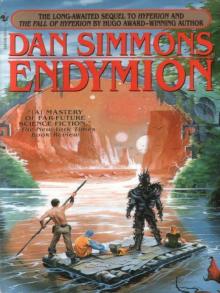 Endymion
Endymion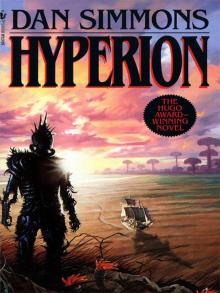 Hyperion
Hyperion The Crook Factory
The Crook Factory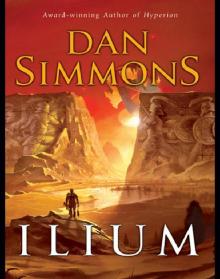 Ilium
Ilium Phases of Gravity
Phases of Gravity Hardcase
Hardcase Fires of Eden
Fires of Eden Children of the Night
Children of the Night Muse of Fire
Muse of Fire Drood
Drood The Fifth Heart
The Fifth Heart Carrion Comfort
Carrion Comfort The Hollow Man
The Hollow Man Summer of Night
Summer of Night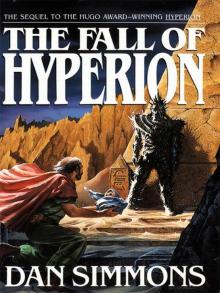 The Fall of Hyperion
The Fall of Hyperion Black Hills
Black Hills A Winter Haunting
A Winter Haunting Hard Freeze
Hard Freeze Prayers to Broken Stones
Prayers to Broken Stones Hard as Nails
Hard as Nails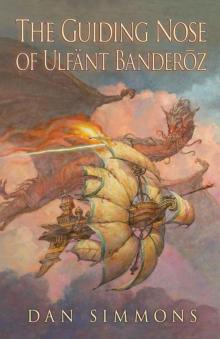 The Guiding Nose of Ulfant Banderoz
The Guiding Nose of Ulfant Banderoz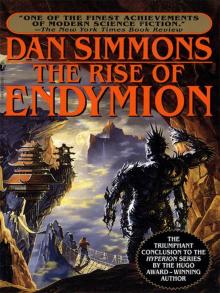 The Rise of Endymion
The Rise of Endymion Orphans of the Helix
Orphans of the Helix Lovedeath
Lovedeath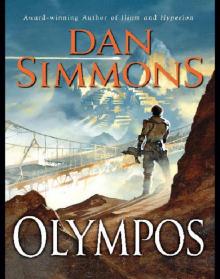 Olympos
Olympos Darwin's Blade
Darwin's Blade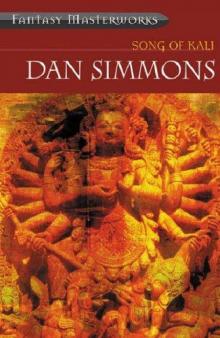 Song of Kali
Song of Kali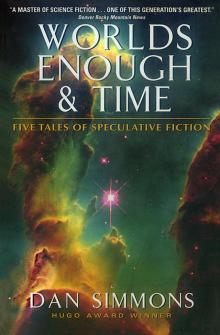 Worlds Enough & Time: Five Tales of Speculative Fiction
Worlds Enough & Time: Five Tales of Speculative Fiction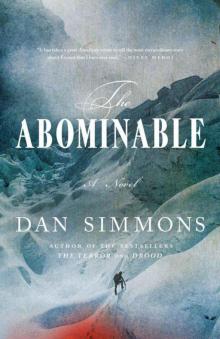 The Abominable
The Abominable The Death of the Centaur
The Death of the Centaur Hard as Nails jk-3
Hard as Nails jk-3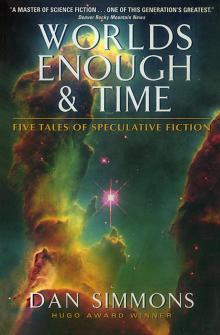 Worlds Enough & Time
Worlds Enough & Time Joe Kurtz Omnibus
Joe Kurtz Omnibus The Hyperion Cantos 4-Book Bundle
The Hyperion Cantos 4-Book Bundle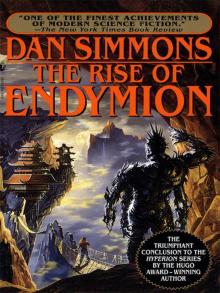 Rise of Endymion
Rise of Endymion Hard Freeze jk-2
Hard Freeze jk-2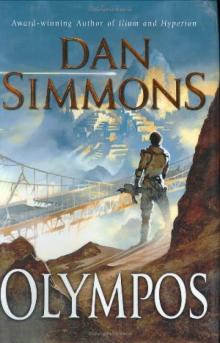 Olympos t-2
Olympos t-2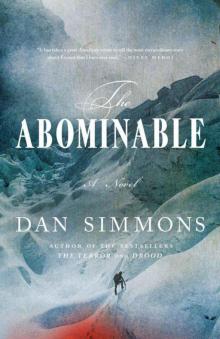 The Abominable: A Novel
The Abominable: A Novel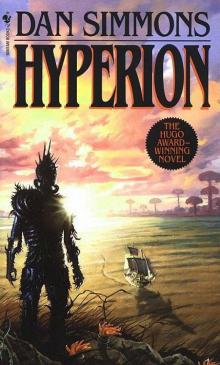 Hyperion h-1
Hyperion h-1 Remembering Siri
Remembering Siri Black Hills: A Novel
Black Hills: A Novel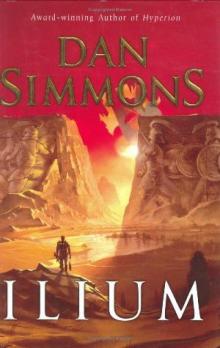 Ilium t-1
Ilium t-1 Hardcase jk-1
Hardcase jk-1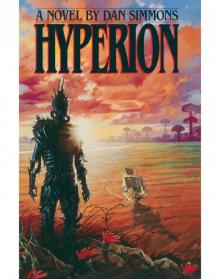 Hyperion 01 - Hyperion
Hyperion 01 - Hyperion